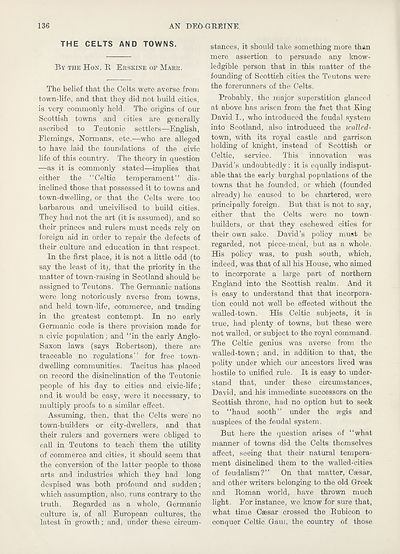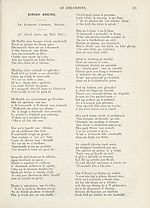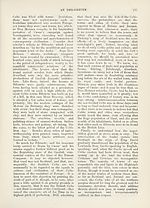An Comunn Gàidhealach Publications > Deo-gréine > Volume 17, October 1921 to September 1922
(144) Page 136
Download files
Complete book:
Individual page:
Thumbnail gallery: Grid view | List view

136
AN DEO-GREINE.
THE CELTS AND TOWNS.
By the Hon. R Erskine of Marr.
The belief that the Celts were averse from
town-life, and that they did not build cities,
is very commonly held. The origins of our
Scottish towns and cities are generally
ascribed to Teutonic settlers—English,
Flemings, Normans, etc.—who are alleged
to have laid the foundations of the civic
life of this country. The theory in question
—as it is commonly stated—implies that
either the “Celtic temperament” dis¬
inclined those that possessed it to towns and
town-dwelling, or that the Celts were too
barbarous and uncivilised to build cities.
They had not the art (it is assumed), and so
their princes and rulers must needs rely on
foreign aid in order to repair the defects of
their culture and education in that respect.
In the first place, it is not a little odd (to
say the least of it), that the priority in the
matter of town-raising in Scotland should be
assigned to Teutons. The Germanic nations
were long notoriously averse from towns,
and held town-life, commerce, and trading
in the greatest contempt. In no early
Germanic code is there provision made for
a civic population; and “in the early Anglo-
Saxon laws (says Robertson), there are
traceable no regulations” for free town¬
dwelling communities. Tacitus has placed
on record the disinclination of the Teutonic
people of his day to cities and civic-life;
and it would be easy, were it necessary, to
multiply proofs to a similar effect.
Assuming, then, that the Celts were no
town-builders or city-dwellers, and that
their rulers and govemers were obliged to
call in Teutons to teach them the utility
of commerce and cities, it should seem that
the conversion of the latter people to those
arts and industries which they had long
despised was both profound and sudden;
which assumption, also, runs contrary to the
truth. Regarded as a whole, Germanic
culture is, of all European cultures, the
latest in growth; and, under these circum¬
stances, it should take something more than
mere assertion to persuade any know-
ledgible person that in this matter of the
founding of Scottish cities the Teutons were
the forerunners of the Celts.
Probably, the major superstition glanced
at above has arisen from the fact that King
David I., who introduced the feudal system
into Scotland, also introduced the walled-
town, with its royal castle and garrison
holding of knight, instead of Scottish or
Celtic, service. This innovation was
David’s undoubtedly: it is equally indisput¬
able that the early burghal populations of the
towns that he founded, or which (founded
already) he caused to be chartered, were
principally foreign. But that is not to say,
either that the Celts were no town-
builders, or that they eschewed cities for
their own sake. David’s policy must be
regarded, not piece-meal, but as a whole.
His policy was, to push south, which,
indeed, was that of all his House, who aimed
to incorporate a large part of northern
England into the Scottish realm. And it
is easy to understand that that incorpora¬
tion could not well be effected without the
walled-town. His Celtic subjects, it is
true, had plenty of towns, but these were
not walled, or subject to the royal command.
The Celtic genius was averse from the
walled-town; and, in addition to that, the
polity under which our ancestors lived was
hostile to unified rule. It is easy to under¬
stand that, under these circumstances,
David, and his immediate successors on the
Scottish throne, had no option but to seek
to “baud sooth” under the gegis and
auspices of the feudal system.
But here the question arises of “what
manner of towns did the Celts themselves
affect, seeing that their natural tempera¬
ment disinclined them to the walled-cities
of feudalism?” On that matter, Csesar,
and other writers belonging to the old Greek
and Roman world, have thrown much
light. For instance, we know for sure that,
what time Caesar crossed the Rubicon to
conquer Celtic Gaui, the country of those
AN DEO-GREINE.
THE CELTS AND TOWNS.
By the Hon. R Erskine of Marr.
The belief that the Celts were averse from
town-life, and that they did not build cities,
is very commonly held. The origins of our
Scottish towns and cities are generally
ascribed to Teutonic settlers—English,
Flemings, Normans, etc.—who are alleged
to have laid the foundations of the civic
life of this country. The theory in question
—as it is commonly stated—implies that
either the “Celtic temperament” dis¬
inclined those that possessed it to towns and
town-dwelling, or that the Celts were too
barbarous and uncivilised to build cities.
They had not the art (it is assumed), and so
their princes and rulers must needs rely on
foreign aid in order to repair the defects of
their culture and education in that respect.
In the first place, it is not a little odd (to
say the least of it), that the priority in the
matter of town-raising in Scotland should be
assigned to Teutons. The Germanic nations
were long notoriously averse from towns,
and held town-life, commerce, and trading
in the greatest contempt. In no early
Germanic code is there provision made for
a civic population; and “in the early Anglo-
Saxon laws (says Robertson), there are
traceable no regulations” for free town¬
dwelling communities. Tacitus has placed
on record the disinclination of the Teutonic
people of his day to cities and civic-life;
and it would be easy, were it necessary, to
multiply proofs to a similar effect.
Assuming, then, that the Celts were no
town-builders or city-dwellers, and that
their rulers and govemers were obliged to
call in Teutons to teach them the utility
of commerce and cities, it should seem that
the conversion of the latter people to those
arts and industries which they had long
despised was both profound and sudden;
which assumption, also, runs contrary to the
truth. Regarded as a whole, Germanic
culture is, of all European cultures, the
latest in growth; and, under these circum¬
stances, it should take something more than
mere assertion to persuade any know-
ledgible person that in this matter of the
founding of Scottish cities the Teutons were
the forerunners of the Celts.
Probably, the major superstition glanced
at above has arisen from the fact that King
David I., who introduced the feudal system
into Scotland, also introduced the walled-
town, with its royal castle and garrison
holding of knight, instead of Scottish or
Celtic, service. This innovation was
David’s undoubtedly: it is equally indisput¬
able that the early burghal populations of the
towns that he founded, or which (founded
already) he caused to be chartered, were
principally foreign. But that is not to say,
either that the Celts were no town-
builders, or that they eschewed cities for
their own sake. David’s policy must be
regarded, not piece-meal, but as a whole.
His policy was, to push south, which,
indeed, was that of all his House, who aimed
to incorporate a large part of northern
England into the Scottish realm. And it
is easy to understand that that incorpora¬
tion could not well be effected without the
walled-town. His Celtic subjects, it is
true, had plenty of towns, but these were
not walled, or subject to the royal command.
The Celtic genius was averse from the
walled-town; and, in addition to that, the
polity under which our ancestors lived was
hostile to unified rule. It is easy to under¬
stand that, under these circumstances,
David, and his immediate successors on the
Scottish throne, had no option but to seek
to “baud sooth” under the gegis and
auspices of the feudal system.
But here the question arises of “what
manner of towns did the Celts themselves
affect, seeing that their natural tempera¬
ment disinclined them to the walled-cities
of feudalism?” On that matter, Csesar,
and other writers belonging to the old Greek
and Roman world, have thrown much
light. For instance, we know for sure that,
what time Caesar crossed the Rubicon to
conquer Celtic Gaui, the country of those
Set display mode to:
![]() Universal Viewer |
Universal Viewer | ![]() Mirador |
Large image | Transcription
Mirador |
Large image | Transcription
| An Comunn Gàidhealach > An Comunn Gàidhealach Publications > Deo-gréine > Volume 17, October 1921 to September 1922 > (144) Page 136 |
|---|
| Permanent URL | https://digital.nls.uk/127171701 |
|---|
| Description | Leabhar 17, Treasamh Mios an Fhoghair 1921 gu Dara Mìos an Fhoghair 1922 |
|---|---|
| Attribution and copyright: |
|
| Description | This contains items published by An Comunn, which are not specifically Mòd-related. It includes journals, annual reports and corporate documents, policy statements, educational resources and published plays and literature. It is arranged alphabetically by title. |
|---|
| Description | A collection of over 400 items published by An Comunn Gàidhealach, the organisation which promotes Gaelic language and culture and organises the Royal National Mòd. Dating from 1891 up to the present day, the collection includes journals and newspapers, annual reports, educational materials, national Mòd programmes, published Mòd literature and music. |
|---|---|
| Additional NLS resources: |
|

